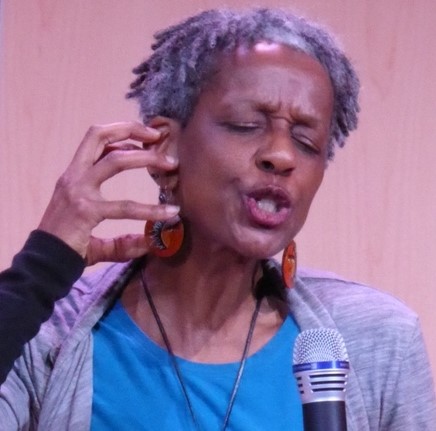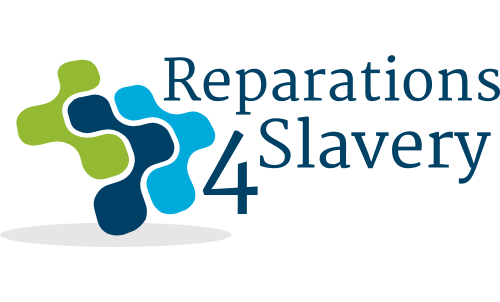Interview with Norma Johnson

R4S: Norma, please tell us about your family background. Where did you grow up? What was happening at that time?
NJ: Well, I grew up in New Jersey. My parents had just bought a house and the neighborhood was in a largely immigrant area, so I was exposed to people from many countries: Italians, eastern Europeans, South Americans, Caribbean peoples, and African Americans. Most of my classmates in school were first generation in this country. The uniqueness of people and their cultures has always fascinated me; living in that place contributed to how I view the world.
R4S: Was there racial tension in the community?
NJ: Families in the community were in the process of assimilating, what I call ‘becoming white.’ There was a sense of learning to identify the pecking order, that being black or brown was not as good as being white.
And it seemed we were all adjusting accordingly as we adapted to the social norms around us. White and light skinned folk found that once they could lose identifying traits like native accents, cultural dress & behaviors, they could cross the boundaries, restrictions and escape the denigration of “immigrant” status. Then they could become more accepted and be able to access the resources reserved for being “white.” Those of us who were identified as black or brown continued to navigate the negative prospects of being less-than-white. And in the case of being black, not even always being identified as fully human.
R4S: Was your family involved in the civil rights movement?
NJ: My dad was very influential. He was the first black sergeant in the local police force and an activist. He was always working to make things better for black people; this was during the heyday of the NAACP. We would have literature at home about all the accomplishments of black people, stories that I had never heard about in school.
R4S: At what point did you receive your calling to begin writing, especially about racial justice?
NJ: I've been writing since I was very young, but in the last 10 years my focus shifted to racial justice themes. That’s due the incredible frustration of living here, in Boulder Colorado, and realizing that the white people here have no understanding of my experience as a black person in America. I get constant pushback, defensiveness, fragility - the behaviors typical of racism. Rather than just drown in that environment, my writing has acted like a lifesaver. It buoys me up, it serves as a navigation tool.
R4S: You have a series called “Poems For My White Friends.” What has the response been to that series?
NJ: The work has been very well-received. People are very intrigued by the initial concept and surprised both by what I have to say and by their own responses. Some people even send this poem to friends or relatives that they're having difficulty with engaging conversation about race.
R4S: How would you say the visual and spoken format differs in terms of the impact?
NJ: I really steer folks towards hearing and seeing my work if possible. When people read, they interpret through their own lens; they may intellectualize the work. When people are listening to my voice, they're much more in a receiving mode; my voice can carry them to places that they can't get to on their own. So that's the preferred method for my current work in this series. I call this form poetic storytelling.
R4S: When people have received this message, this direct transmission from your heart - what kind of responses have you received?
NJ: Silence. Silence is the immediate response. It's as if people are in an altered state. I consider it to be very successful then when that happens. In that state, people are having a direct experience. They aren't thinking, trying to figure something out. For a few moments may not even know who or where they are. That's a good state to be in, to receive this work. That way, when we do start conversation we are in a different place, a deeper place, a sacred place. Often afterwards I ask people for single words to describe how they feel. The expressions that come forth are very deep types of feelings.
You know, I believe societal change will only occur when people’s feelings change. The time for applying Band-Aids is over.
R4S: What else would you say about your work?
NJ: I tend to live in the mystery of things. If I have a goal for this work, it's really to create a space where people can enter this story and see where it leads them.
R4S: What are your feelings about reparations for slavery?
NJ: I see reparations as a restoration of our humanity. A lot had to be “dehumanized” for types of terrorization like genocide, kidnapping, slavery, torture, rape, lynching and dismemberment to take place. Not only have Indigenous, black, people of color and others been subjected to these things in our country, it is still taking place at modern levels. Whole cultures and groups of people have been denigrated, sometimes destroyed. That means men, women and children who suffer the immediate effects of these acts of terror and thousands more who inherit this lineage of trauma and continued denigration.
Included in this lineage of trauma, are those who identify as white people. To perpetrate or know of these things and not change the course of them, requires a relinquishing of some part of one’s humanity. To remain silent requires an investment in maintaining the course of this suffering. But a feeling stays with us, generation after generation, quietly and sometimes with a shrill voice, letting us know that this DOES NOT FEEL RIGHT! I believe it is our humanity that is at risk here.
